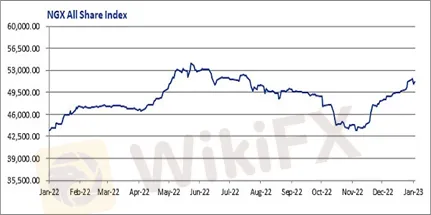简体中文
繁體中文
English
Pусский
日本語
ภาษาไทย
Tiếng Việt
Bahasa Indonesia
Español
हिन्दी
Filippiiniläinen
Français
Deutsch
Português
Türkçe
한국어
العربية
Trading Psychology: our foundation to success
Abstract:In a world market roiled by crises and a national economy made more difficult by misalignments, the capital market has proven its resiliency. Governments and corporations increasingly look to the stock market as the safety net for their financial futures.


In a world market roiled by crises and a national economy made more difficult by misalignments, the capital market has proven its resiliency. Governments and corporations increasingly look to the stock market as the safety net for their financial futures. The domestic investors want capital gains and dividends to continue to flow. Taofik Salako, Deputy Group Business Editor, explores the market's underlying currents in anticipation of another optimistic year. The N21.83 trillion 2023 budget is expected to be funded for over one-third of the time by debt issuances on the domestic capital market, according to the Federal Government. Nigeria, like many other countries, has become more dependent on internal resources as a result of the global crises that are forcing states to rely on self-survival.
Given the effects of the country's foreign currency (forex) crisis on the problem of foreign debt, the relative depth and resilience of the market have shown to be the much-needed support mechanism. In 2022, governments and corporations raised a minimum of N5 trillion through fresh debt and stock issuance. More than 75% of capital market transactions are made by domestic investors.
The N11.34 trillion budget deficit for 2023 will be mostly paid for by borrowings, according to the Federal Government. These include N206.18 billion, N7.04 trillion from domestic debt issuances, N1.76 trillion from foreign sources, N1.77 trillion from multilateral and bilateral loan drawdowns, and N1.76 trillion from foreign sources.
The capital market has been a significant bright spot in the economy's forex-strapped and inflation-ragged state.
Contrary to the general trend, the stock market's net capital gains totaled N4.45 trillion. The benchmark index for the stock market ended 2022 with a full-year average return of 19.98%, or a net capital gain of N4.455 trillion, defying the perception that prices tend to decline in election years. This was the third year in a row when a notable bullish run continued. Nigerian stocks ended 2021 with an average return of 6.07 percent, or N1.278 trillion in net capital gains. Nigerian stocks experienced an average return of 50.03 percent in the throes of the COVID-19 pandemic in 2020, translating to net capital gains of N6.483 trillion.
In comparison to 42,716.44 points in 2022, the All Share Index (ASI), a common value-based index that tracks all share prices at the Nigerian Exchange (NGX), concluded 2022 at 51,251.06 points, reflecting an average return of 19.98%. The total market value of all listed securities at the NGX increased from N22.297 trillion at the beginning of 2022 to N27.915 trillion at the end of the year, a gain of 25.2% or N5.62 trillion. According to Afrinvest, the equities market would only return a modest 7.3% in 2023 due to factors like improving corporate earnings, moderating fixed-income returns, and shifting forex dynamics. The macroeconomic forecast supports a good trend for the capital market, according to Mr. Aruna Kebira, managing director of Globalview Capital Limited.
Despite the political shift, he pointed out trend will continue this year.
Every new year brings with it a certain level of hysteria. Analyst forecasts, spiritual forecasts, dreams, and the like. Elections take place every year—2023, 2023 is no exception—and voters always hope for improved leadership after an election. Actually, the third quarter profit reports weren't bad. While waiting for the audited Report, the NGX has ordered that all issuers provide their management reports, also known as unaudited reports, first 60 days following the end of the fiscal year.
It was noted that in the final days of December 2022, the market paid all issuers who came to the market with notices of board meetings in anticipation of the release of their unaudited reports.
If there isn't another unexpected incident waiting around the corner, all of these will define the beginning of the market and finally drive it northward.
A fourth straight uptrend would signal a new high stock market's recent history and could create new levels of resistance.

Disclaimer:
The views in this article only represent the author's personal views, and do not constitute investment advice on this platform. This platform does not guarantee the accuracy, completeness and timeliness of the information in the article, and will not be liable for any loss caused by the use of or reliance on the information in the article.
Read more

Webull and Others Fined $275,000 for Incomplete Suspicious Activity Reports
Webull Financial, alongside Lightspeed Financial Services Group and Paulson Investment Company, LLC, has agreed to pay a collective fine of $275,000 following an investigation by the US Securities and Exchange Commission (SEC). The penalty was issued due to the firms’ failure to include essential information in suspicious activity reports (SARs) over a four-year period.

Alleged Concerns with TradeEU.global's Trading Practices
An individual trader has come forward with allegations of an unfavourable experience while using the services of the broker TradeEU.global.

Lured by False Promises: Malaysian Driver Lost RM218K to an Investment Scam
A 49-year-old e-hailing driver in Malaysia fell victim to a fraudulent investment scheme, losing RM218,000 in a matter of weeks. The scheme, which falsely promised returns of 3 to 5 per cent within just three days, left the individual financially devastated.

Italian Regulator Warns Against 5 Websites
The Italian regulator, CONSOB has issued a warning against five websites offering unauthorized financial services. This regulatory action aims to protect the public from fraudulent activities.
WikiFX Broker
Latest News
Saxo & Portuguese Bank Partnership
SEC Fines Broker-Dealers $275K for Incomplete SAR Filings
Elon Musk Warns of Imminent US Bankruptcy | Bitcoin Retreats from $100K
UK FCA Fines Barclays £40 Million Over 2008 Deal
WikiEXPO Global Expert Interview: Advanced Practices and Insights in Financial Regulation
Justin Sun Invests $30M in Trump-Backed World Liberty Financial
Lured by False Promises: Malaysian Driver Lost RM218K to an Investment Scam
FTX Sets March 2025 Timeline for Creditor Payouts: What It Means for Investors
What is an Economic Calendar? How it works
Pros & Cons of Automated Forex Trading
Currency Calculator


